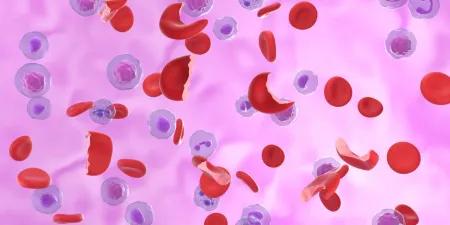
Hypertension (HTN) is an abnormal increase in pressure within the blood vessels. It is often difficult to determine the exact cause of this condition, but certain risk factors may explain it. Let's explore this chronic and silent disease.
What is blood pressure?
Blood pressure refers to the pressure of blood pumped by the heart on the walls of the vessels through which it passes. This pressure, when normal, is essential for proper blood circulation in the body. The means used to measure it is the use of a cuff, either manual or electric, placed on the arm. It is generally described by two values, the "systolic" pressure, which is the maximum pressure when the heart pumps forcefully to eject blood, and the diastolic pressure, which corresponds to the pressure in the vessels when the heart relaxes.
What is high blood pressure?
High blood pressure is when the systolic value is higher than 140mmHg and/or a diastolic value higher than 90mmHg, repeatedly over the course of 3 successive consultations. Indeed, it is important to confirm these values several times in a row under good measurement conditions to ensure that it is not just an occasional elevation of blood pressure due to stress, physical exertion, or consumption of coffee or tobacco. High blood pressure is therefore an abnormal condition marked by a constant elevation of blood pressure, regardless of an external situation or stimulus.
What are the symptoms of high blood pressure?
High blood pressure is a silent disease that can evolve for many years without being noticed. And even when it manifests itself, the symptoms are not specific and may go unnoticed.
- Headaches. They can occur early in the morning, often accompanied by fatigue.
- Dizziness
- Ringing in the ears
- Vision problems
- Nosebleeds
- Palpitations
If any of these symptoms are observed, it is advisable to go to the hospital where blood pressure will be systematically taken at each consultation.
It should also be noted that severe hypertensive episodes can cause sudden onset discomfort, severe headaches, and even respiratory distress.
What are the causes of high blood pressure?
Two types of high blood pressure are distinguished:
- Essential hypertension, which is a constant elevation of blood pressure with no identified cause. This is the most common type of hypertension, found in nearly 90% of cases.
- Secondary hypertension due to an underlying disease, such as kidney disease, endocrine (Addison's disease, thyroid dysfunction, or acromegaly), or adrenal (Conn's syndrome or corticoadrenal adenoma, pheochromocytoma, or medullary adrenal tumor) disease. Some vascular conditions can cause high blood pressure, as can certain treatments. In very rare cases, high blood pressure may have a genetic origin in the case of familial kaliemic hypertension or Gordon syndrome.
However, certain risk factors are known, classified into two categories, modifiable risk factors, and non-modifiable risk factors. Among the non-modifiable risk factors, we note:
- Age
- Family history of high blood pressure
- Chronic kidney disease
- Prematurity and low birth weight.
- Psychosocial stress
Modifiable risk factors are related to habits and lifestyle. These are:
- Overweight, observed in medicine by a body mass index greater than 25
- Sedentary lifestyle, which is the absence of regular physical activity: it is recommended to practice at least 30 minutes of physical activity per day, at least 3 days a week.
- High salt intake: the daily dose of salt should not exceed 5 grams, for all meals combined. To better monitor salt intake, it is recommended to avoid industrial foods, even sweet ones, as they often contain excessive amounts of salt intended to enhance flavor.
- Tobacco consumption
- Alcohol abuse
How to prevent high blood pressure?
As mentioned earlier, essential hypertension accounts for 90% of cases. To prevent it, it is important to pay particular attention to lifestyle habits, engage in regular physical activity, limit salt intake, quit smoking, and moderate alcohol consumption. Regular screenings, systematic blood pressure measurements during consultations, especially if you have a family history of high blood pressure, or chronic kidney disease, are recommended.
What are the complications of high blood pressure?
High blood pressure is a risk factor for several cardiovascular, renal, or ocular (eye) diseases. If left untreated, high blood pressure can quickly lead to
- Stroke or CVA
- Myocardial infarction or cardiac ischemia
- Chronic kidney failure
- Retinopathy
- Neurodegenerative disease
- Arterial disease of the lower limbs.
Likewise, uncontrolled high blood pressure can quickly evolve into heart failure, as it forces the heart muscle to pump harder to maintain normal output. This leads, in the long run, to left ventricular hypertrophy.
What treatment is available for high blood pressure?
The treatment of hypertension aims to lower blood pressure below threshold values. These values may vary depending on the grade of hypertension, and also certain co-existing pathologies, in the case of CVA for example. The first therapeutic action does not consist of prescribing medication, but rather applying hygienic-dietary measures. These are:
- Reducing salt consumption to less than 6 grams per day
- Weight reduction in case of overweight
- Engaging in regular and adapted physical activity according to your current health status
- Smoking cessation
- A healthy diet, rich in fruits and vegetables, and low in animal fats
The doctor decides, depending on the patient and certain factors, whether or not to associate pharmacological treatment. The modern physician has several antihypertensive medications at their disposal, which are prescribed alone (monotherapy) or in combination (bi or triple therapy). The therapy is then adjusted according to the evolution of blood pressure readings, tolerance, or intolerance to the medication. Antihypertensive treatment is very personal depending on the patient's profile, medical, family history, response, and tolerance. Never take medications from someone else, and do not self-medicate. Consult your doctor.


